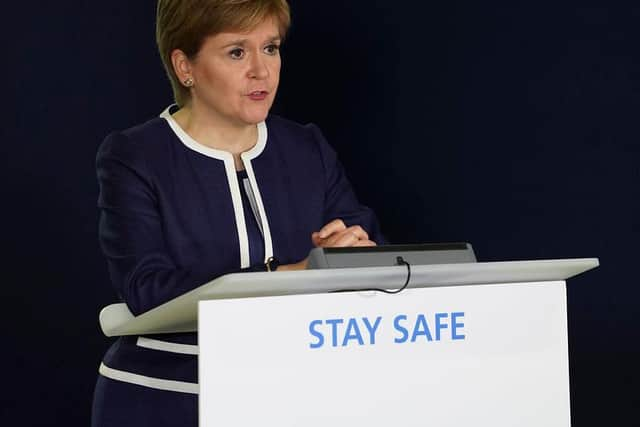Drop-in clinics may be used to increase vaccine uptake in younger Scots, Nicola Sturgeon has said
Speaking at a Scottish Government coronavirus briefing on Friday, the First Minister warned young people that despite their comparatively low risk of serious illness or death from Covid-19, they should still “be careful” as restrictions ease.
She also urged younger people to get a vaccine when they are offered one.


Advertisement
Hide AdAdvertisement
Hide AdMs Sturgeon indicated that a high proportion of hospital cases in Scotland connected to Covid-19 were among younger age groups in a marked change to the picture in hospitals during the first and second waves of Covid-19.
However, she was questioned on whether she was comfortable with the balance of risk for young people as the economy continues to slowly reopen.
Younger people are least likely to have received a vaccine at this stage of the vaccination rollout, but are the most likely age group to be working in hospitality and retail sectors as the economy reopens.
Some are concerned the combination of the more transmissable variant, opening up of the economy, and a lack of vaccine could see cases rise amongst the youngest in Scotland.
The First Minister responded: “I don’t feel comfortable about any of this. I think the choices people are having to make right now, the trade-offs people are having to make, the judgements people are having to make not just as government ministers and advisers, but the judgements people are making in their every day lives are horrendous and are really, really difficult and none of us feel comfortable with it.
"And you’re absolutely right, because of how young people live their lives, more likely to share flats and accommodation, more likely to work in the areas of the economy where they may a slightly elevated risk, that has been the reality for young people and that is really really difficult.
"We have to keep people in work, we need to keep the economy going as far as possible and get it recovered as far as possible, but we have a duty to protect young people just as we have a duty to protect everyone else.”
She added: “These are all the factors that we are all having to balance every single day but if you are asking me if I feel heart sorry for this generation of young people right now for all of these reasons and many more, absolutely I do.
Advertisement
Hide AdAdvertisement
Hide Ad"I want to assure young people that it may not feel like it every day but these things are in our minds, and high up in our minds when we are trying to take these difficult decisions.
"We are trying to make that [vaccination] more accessible for you as we go down the age groups, things like drop-in clinics I think we will continue to see as a feature of this as we try, recognising that it is easier for an older person to make a vaccine appointment whenever they get it than a younger person who has to be at work for example.
"I don’t pretend this is easy at all.”
A message from the Editor:
Thank you for reading this article. We're more reliant on your support than ever as the shift in consumer habits brought about by coronavirus impacts our advertisers.
If you haven't already, please consider supporting our trusted, fact-checked journalism by taking out a digital subscription.
Comments
Want to join the conversation? Please or to comment on this article.
